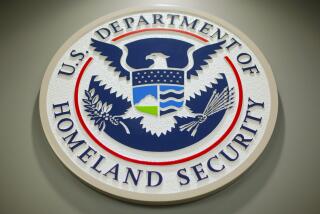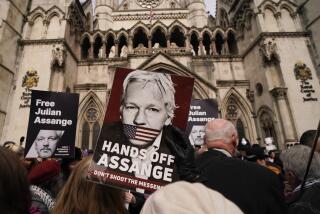Snowden still seeks asylum offer; U.S. ‘ready to take him back’
WASHINGTON — The Obama administration appeared increasingly confident Wednesday that Edward Snowden’s next plane trip will be a return flight to the United States, as U.S. diplomats stepped up pressure on other countries to deny political asylum to the fugitive former National Security Agency contractor.
State Department officials said they had urged other governments not to assist Snowden, who faces espionage charges for leaking highly classified documents about U.S. intelligence surveillance systems around the globe, spurring an international debate over the reach of U.S. spying.
“Officials have been in touch with a broad range of countries,” Jennifer Psaki, a State Department spokeswoman, said Wednesday. “We’ve been crystal-clear on what we want to happen.”
Snowden has asked 21 countries for asylum to avoid U.S. prosecution, but none has offered him permanent refuge.
At the Justice Department, a senior official said the FBI and federal prosecutors were banking on Russian officials to break the stalemate and force Snowden to leave the international transit zone at Moscow’s Sheremetyevo airport, where he apparently has holed up for the last 10 days.
“There are laws for how long someone can stay there,” the official said, speaking anonymously because of the sensitivity of the case.
But a Russian Foreign Ministry official in Moscow said the law was not nearly so clear, and that Snowden had not technically entered Russia.
“As far as we know, Snowden can stay in the transit zone indefinitely or as long as he wishes before he gets a legitimate set of traveling papers and chooses to fly somewhere else,” said the official, who also spoke on condition of anonymity. “The fact that some countries are reluctant in offering or granting him asylum has nothing to do with terms of his stay at the Sheremetyevo transit zone.”
The State Department revoked Snowden’s passport when he fled Hong Kong for Moscow last month, but U.S. officials said Wednesday that won’t keep him from returning home.
“He’s not marooned,” said Nanda Chitre, the top spokesperson at the Justice Department. “He’s not stateless. He’s a U.S. citizen. No one has revoked his citizenship. His country is ready to take him back and issue a travel document so he can return to this country.”
Snowden’s fate thus remained in limbo a day after a passenger jet flying Bolivian President Evo Morales home from a conference in Moscow was blocked from entering French, Portuguese, Spanish and Italian airspace, ostensibly because of suspicion that Snowden was aboard.
The plane made an unscheduled landing Tuesday night in Vienna, and Austrian officials who boarded and inspected the aircraft said Snowden was not a passenger.
On Wednesday, French, Spanish and Portuguese officials denied Morales’ angry charges that they had buckled to U.S. pressure to force down the Bolivian leader despite diplomatic protocols. An Austrian official said the inspection of Morales’ plane on the tarmac was “voluntary,” adding that “this did not happen by request of the United States.”
French President Francois Hollande said his government received contradictory information suggesting that Snowden might be on one of several aircraft that might fly over France, and that he didn’t realize that the Bolivian president was aboard the flight forced to Vienna.
“As soon as I knew that it was the plane of Bolivia’s president, I immediately gave my authorization for the overflight,” Hollande said. Officials said the French minister of foreign affairs telephoned his Bolivian counterpart to apologize.
Portuguese authorities said they granted Morales’ plane permission to fly over their country, but denied him permission to land for unspecified technical reasons.
A former U.S. official said an American request for allies to prevent the flight of a fugitive would be viewed as routine and probably would not require special political pressure from Washington.
“The international system depends on countries cooperating on things like this.… Nobody wants to be seen as aiding a fugitive,” said the official, who also declined to be identified.
The explanations didn’t stop a torrent of outrage from Latin American leaders, who portrayed the treatment of Morales as an affront and a violation of international courtesies, if not law.
“This is EXTREMELY serious,” Rafael Correa, the president of Ecuador, wrote on his Twitter account.
Argentine President Cristina Fernandez de Kirchner called for an urgent meeting of South American presidents to lodge a protest. “Be calm,” she wrote in a post late Tuesday. “They will not [be allowed to] do this.”
Morales, Correa, Kirchner and several others form a bloc of pro-left Latin American presidents who often challenge U.S. positions. But the more conservative leadership of the Organization of American States, the hemisphere’s principal political body to which the U.S. belongs, also protested.
“Nothing justifies an act of such lack of respect for the highest authority of a country,” OAS Secretary-General Jose Miguel Insulza said in a statement. “The countries involved must give an explanation of the reasons why they took this decision, in particular as it endangered the life of the leader of a member country of the OAS.”
Times staff writers Tracy Wilkinson in Mexico City, Sergei L. Loiko in Moscow and Shashank Bengali in Washington contributed to this report.
More to Read
Sign up for Essential California
The most important California stories and recommendations in your inbox every morning.
You may occasionally receive promotional content from the Los Angeles Times.












